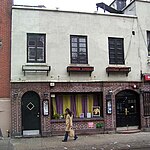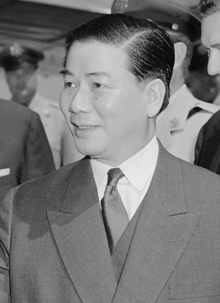The 1960s Portal
The 1960s became synonymous with the new, radical, and subversive events and trends of the period. In Africa the 1960s was a period of radical political change as 32 countries gained independence from their European colonial rulers. Some commentators have seen in this era a classical Jungian nightmare cycle, where a rigid culture, unable to contain the demands for greater individual freedom, broke free of the social constraints of the previous age through extreme deviation from the norm. Christopher Booker charts the rise, success, fall/nightmare and explosion in the London scene of the 1960s. However, this alone does not explain the mass nature of the phenomenon. Several nations such as the U.S., France, Germany and Britain turned to the left in the early and mid 1960s. In the United States, John F. Kennedy, a Keynesian and staunch anti-communist, pushed for social reforms. His assassination in 1963 was a stunning shock. Liberal reforms were finally passed under Lyndon B. Johnson including civil rights for African Americans and healthcare for the elderly and the poor. Despite his large-scale Great Society programs, Johnson was increasingly reviled by the New Left at home and abroad. The heavy-handed American role in the Vietnam War outraged student protestors across the globe, as they found peasant rebellion typified by Ho Chi Minh and Che Guevara more appealing. Italy formed its first left-of-center government in March 1962 with a coalition of Christian Democrats, Social Democrats, and moderate Republicans. Socialists joined the ruling block in December 1963. In Britain, the Labour Party gained power in 1964. In Brazil, João Goulart became president after Jânio Quadros resigned. This is a Featured article, which represents some of the best content on English Wikipedia..
On November 11, 1960, a failed coup attempt against President Ngô Đình Diệm of South Vietnam was led by Lieutenant Colonel Vương Văn Đông and Colonel Nguyễn Chánh Thi of the Airborne Division of the Army of the Republic of Vietnam (ARVN). The rebels launched the coup in response to Diệm's autocratic rule and the negative political influence of his brother Ngô Đình Nhu and sister-in-law Madame Nhu. They also bemoaned the politicisation of the military, whereby regime loyalists who were members of the Ngô family's covert Cần Lao Party were readily promoted ahead of more competent officers who were not insiders. Đông was supported in the conspiracy by his brother-in-law Lieutenant Colonel Nguyen Trieu Hong, whose uncle was a prominent official in a minor opposition party. The main link in the coup was Đông's commanding officer Thi, whom he persuaded to join the plot. (Full article...) This is a Good article, an article that meets a core set of high editorial standards.
Goldfinger is a 1964 spy film and the third instalment in the James Bond series produced by Eon Productions, starring Sean Connery as the fictional MI6 agent James Bond. It is based on the 1959 novel of the same name by Ian Fleming. The film also stars Honor Blackman, Gert Fröbe and Shirley Eaton. Goldfinger was produced by Albert R. Broccoli and Harry Saltzman. The film was the first of four Bond films directed by Guy Hamilton. The film's plot has Bond investigating the gold magnate Auric Goldfinger, who plans to contaminate the United States Bullion Depository at Fort Knox. Goldfinger was the first Bond blockbuster, with a budget equal to that of the two preceding films combined. Principal photography took place from January to July 1964 in the United Kingdom, Switzerland and the United States. (Full article...) Selected picture - American folk singers Joan Baez and Bob Dylan, performing a duet at the March on Washington for Jobs and Freedom on August 28, 1963. Both were relatively new recording artists at the time, with Baez being at the forefront of American roots revival and Dylan having just released his second album. Baez was especially influential in introducing audiences to Dylan's music by recording several of his early songs and inviting him onstage during her own concerts.
Did you know -
Related portalsThis is a Featured article, which represents some of the best content on English Wikipedia..
Sir Richard Starkey MBE (born 7 July 1940), known professionally as Ringo Starr, is an English musician, songwriter and actor who achieved international fame as the drummer for the Beatles. Starr occasionally sang lead vocals with the group, usually for one song on each album, including "Yellow Submarine" and "With a Little Help from My Friends". He also wrote and sang the Beatles songs "Don't Pass Me By" and "Octopus's Garden", and is credited as a co-writer of four others. Starr was afflicted by life-threatening illnesses during childhood, with periods of prolonged hospitalisation. As a teenager Starr became interested in the UK skiffle craze and developed a fervent admiration for the genre. In 1957, he co-founded his first band, the Eddie Clayton Skiffle Group, which earned several prestigious local bookings before the fad succumbed to American rock and roll around early 1958. When the Beatles formed in 1960, Starr was a member of another Liverpool group, Rory Storm and the Hurricanes. After achieving moderate success in the UK and Hamburg, he quit the Hurricanes when he was asked to join the Beatles in August 1962, replacing Pete Best. (Full article...) This is a Good article, an article that meets a core set of high editorial standards.
Félix Houphouët-Boigny (French: [feliks ufwɛ(t) bwaɲi]; 18 October 1905 – 7 December 1993), affectionately called Papa Houphouët or Le Vieux ("The Old One"), was an Ivorian politician and physician who served as the first president of Ivory Coast from 1960 until his death in 1993. A tribal chief, he worked as a medical aide, union leader, and planter before being elected to the French Parliament in 1945. He served in several ministerial positions within the Government of France before leading Ivory Coast following independence in 1960. Throughout his life, he played a significant role in politics and the decolonisation of Africa. Under Houphouët-Boigny's politically moderate leadership, Ivory Coast prospered economically. This success, uncommon in poverty-ridden West Africa, became known as the "Ivorian miracle"; it was due to a combination of sound planning, the maintenance of strong ties with the West (particularly France) and development of the country's significant coffee and cocoa industries. However, reliance on the agricultural sector caused difficulties in 1980, after a sharp drop in the prices of coffee and cocoa. (Full article...)
Selected article - The Vietnam War was a conflict in Vietnam, Laos, and Cambodia from 1 November 1955 to the fall of Saigon on 30 April 1975. It was the second of the Indochina Wars and a major conflict of the Cold War. While the war was officially fought between North Vietnam and South Vietnam, the north was supported by the Soviet Union, China, and other countries in the Eastern Bloc, while the south was supported by the US and anti-communist allies. This made the conflict a proxy war between the US and Soviet Union. Direct US military involvement lasted from 1965 until its withdrawal in 1973. The fighting spilled over into the Laotian and Cambodian civil wars, which ended with all three countries becoming communist in 1975. After the fall of French Indochina with the 1954 Geneva Conference, the country gained independence from France but was divided into two parts: the Viet Minh took control of North Vietnam, while the US assumed financial and military support for South Vietnam. The North Vietnamese controlled Viet Cong (VC), a South Vietnamese common front of militant leftists, socialists, communists, workers, peasants and intellectuals, initiated guerrilla war in the south. The People's Army of Vietnam (PAVN) engaged in more conventional warfare with US and Army of the Republic of Vietnam (ARVN) forces. North Vietnam invaded Laos in 1958, establishing the Ho Chi Minh trail to supply and reinforce the VC. By 1963, the north had sent 40,000 soldiers to fight in the south. US involvement increased under President John F. Kennedy, from 900 military advisors at the end of 1960 to 16,300 at the end of 1963. (Full article...) More Did you know (auto generated)
TopicsCategoriesWikiProjects
Associated WikimediaThe following Wikimedia Foundation sister projects provide more on this subject:
Discover Wikipedia using portals |




























